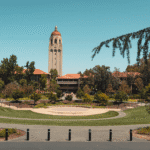
Eighteen minutes’ drive from Duke University’s Pratt School of Engineering (Duke Engineering) is North Carolina’s Research Triangle Park. The largest of its kind in the country, housing 250-plus tech companies, this is where the brightest minds graduating from nearby universities convene to invent the future.
Duke Engineering’s close link to this park is just one example of the school’s authentic experiential learning opportunities for graduate students. From class-based projects for industry clients to internships with leading tech firms across the US, these industry-forward experiences arm students with the knowledge, support and networks needed to make their mark in today’s fast-moving world.
At Duke Engineering, three graduate master’s options are offered: Master of Science (MS), Master of Engineering (MEng) and Master of Engineering Management (MEM). Areas of study range from Electrical & Computer Engineering to Environmental Engineering to Mechanical Engineering to FinTech (Financial Technology) and more.
Each ensures that students not only develop technical know-how, but also a suite of professional skills that will be necessary for their future careers. This includes building a network of contacts, learning project management skills, developing an entrepreneurial mindset and similar assets that pave the way for future success.
The list is long, but it’s grounded in research. Consulting firm McKinsey estimates that the need for advanced IT and programming skills could grow as much as 90 percent between 2016 and 2030. As artificial intelligence and automation grow in importance in each sector, workforce knowledge and skills must be upgraded and adapted accordingly. As the demand for talent in technology, data and engineering increases, Duke Engineering master’s graduates will stand out as a result of their experience-based learning.
Experiential learning impacts engineering students-and their clients
Take, for example, the course-based design projects featured in several Duke Engineering master’s courses. In the Software Engineering class taught by IBM’s former Vice President of Cloud Strategy, Ric Telford, students are organised the same way software companies are structured. Teams of students are working on projects such as making an app for Android and a soup-to-nuts software system for sensor technology company Tyrata.

Source: Duke University
Another course, Mobile Application Development, puts students to work developing apps for local clients–such as “A Portrait of Venice”, an iOS app version of a popular exhibit from Duke’s Nasher Museum of Art; “Home Health Care”, an app to help travelling nurses manage their day and optimise their patient visits; and “Duke Flyer”, a companion app to the digital signage screens that display ads and flyers across campus.
Meanwhile, Duke Biomedical Engineering master’s student teams have created projects such as a modified stethoscope that could monitor cardiac abnormalities, a biometrics recording device that could track infant respiration and heart rate and send the information to a doctor’s phone, and a handheld scanner that used ultrasonic waves to examine bone density.
While projects let students apply their knowledge within a controlled campus setting, internships offer a chance to test-run what they’ve learnt in the real world.
A central feature of its MEM and MEng programmes, and an option for MS students, students describe internships as applied learning at its best.
Shogo Kameyama, Duke MEng ’18, interned at IHI Corporation and at Interstellar Technologies (IST), Japan for the R&D of rocket engine turbopumps. At IHI, he simulated the heat transfer of boiling nitrogen flow, analysing the dynamics of a turbine rotor disk.
He described the knowledge in fluid and structural dynamics gained during these internships as “indispensable” in his role today as a flutter engineer at Honda Aircraft Company.
“Besides, my internships allowed me to learn both traditional and start-up corporate cultures. Knowing two opposite corporate cultures helps me fulfil my daily work thoroughly but efficiently,” he said.
Innovation, commercialisation & entrepreneurship
Duke Engineering students already receive a wealth of experiential learning opportunities to transform their knowledge into ideas and projects. For these to achieve their maximum impact, the next step is to convert them into viable businesses and consequentially, jobs.
Knowing how to transfer ideas from the mind or the laboratory to the marketplace is a valuable trait many companies look for in engineering graduates.

Source: Duke University
Increasingly so for entrepreneurship skills, too. Research shows that students who had taken one or more entrepreneurship courses showed significantly higher levels of entrepreneurial self-efficacy on a number of measures. For recruiters, it’s a signal the candidate can think creatively and a sign of leadership potential.
Not all engineering schools offer this value-added skillset, but Duke Engineering does, with both a Founder’s Track master’s programme focused on engineering entrepreneurship as well as opportunities to practice “intrapreneurship” within an existing firm.
In one recent practicum, a team of Master of Engineering Management students worked with a Fortune 100 financial services organization to develop creative strategies for educating investors about the best ways to guarantee income streams for the rest of their lives. After researching customer needs and benchmarking existing offerings, the team proposed a new way to set and achieve financial goals through an interactive savings system, associated mobile app, and a plan for marketing the opportunity to potential customers.
Another student team was tasked with developing a strategy to help a leading provider of electric vehicle charging solutions expand into international markets. In addition to gaining skills in risk analysis, knowledge of business management and partnership structures, and practical experience in forecasting return on investment, the students polished their professional skills by interacting closely with corporate executives and preparing and delivering a final report on their findings.
An impressed company vice president, who supervised the work, said: “The team’s commitment, resourcefulness, and critical thinking were highly valued by our executive team, and their final report contributed significantly to our analysis of market opportunities and overall strategy. We felt that all of the students would be candidates to join our growing business and make immediate contributions.”
Learn more about master’s programs at Duke Engineering
Follow Duke Engineering on Facebook, Twitter, YouTube, Instagram and LinkedIn
Liked this? Then you’ll love…
Study electrical engineering with Europe’s best
Engineering at Duke – Research and education that builds a better world







